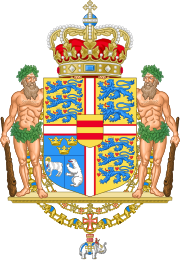Danish opt-outs from the European Union
 |
|---|
A referendum on abolishing one or more of Denmark's opt-outs from European Union legislation in four specific areas (as specified in the Edinburgh Agreement and later confirmed in other treaties of the European Union) will be held at some point between 2008 and 2011, before the next Danish parliamentary election. Prime Minister Anders Fogh Rasmussen announced the referendum plans in his speech on 2007-11-22 after he won the 2007 parliamentary election.[1] It was not announced whether the referendum would only offer a full repeal of all opt-outs, or a case-by-case choice, and no date was announced (except that it would likely be held after the Reform Treaty enters into force, which will likely occur on 2009-01-01).
The current government has been planning to hold a second referendum on abolishing the opt-outs (or at least the euro opt-out) since at least 2004, following a change in public opinion, but the discussions and controversy regarding the Treaty establishing a Constitution for Europe and the Reform Treaty had delayed this.[2]
Opt-outs
Denmark obtained four opt-outs from the Maastricht Treaty following the treaty's initial rejection in a 1992 referendum. The opt-outs are outlined in the Edinburgh Agreement and concern the EMU (as above), the European Security and Defence Policy (ESDP), Justice and Home Affairs (JHA) and the citizenship of the European Union. With these opt-outs the Danish people accepted the treaty in a second referendum held in 1993.
The EMU opt-out means Denmark is not obliged to participate in the third phase of the European Exchange Rate Mechanism, i. e. to replace the Danish krone with the euro. The abolition of the euro opt-out was put to a referendum in 2000 and was rejected. The ESDP opt-out originally meant Denmark would not be obliged to join the Western European Union (which originally handled the defence tasks of the EU). Now it means that Denmark does not participate in the European Union's foreign policy where defence is concerned. Hence it does not take part in decisions, does not act in that area and does not contribute troops to missions conducted under the auspices of the European Union. The JHA opt-out exempts Denmark from certain areas of home affairs. Significant parts of these areas were transferred from the third European Union pillar to the first under the Amsterdam Treaty; Denmark's opt-outs from these areas were kept valid through additional protocols. Acts made under those powers are not binding on Denmark except for those relating to Schengen, which are instead conducted on an intergovernmental basis with Denmark. The citizenship opt-out stated that European citizenship did not replace national citizenship; this opt-out was rendered meaningless when the Amsterdam Treaty adopted the same wording for all members. Under the Reform Treaty, Denmark can change its opt-out from a complete opt-out to the case-by-case opt-in version applying to Ireland and the United Kingdom whenever they wish.[3]
Background
Villy Søvndal, the leader of the Socialist People's Party, has stated that he will be open to discuss an opt-out vote on the citizenship issue but that he remains opposed to revoking the euro and defence clauses, and that he will oppose replacing the legal affairs clause with a refugee policy clause, as well. Søvndal's party is in a strengthened position following its recent election gains (doubling their seats from 11 to 23); under Danish parliamentary practice, an agreement between parties has to be revoked either before or during an election campaign. The SPP was pivotal in establishing the 1993 Edinburgh Agreement and the Danish "national compromise" on the Maastricht Treaty referendum repetition issue, and no party retracted its support for this agreement before the 2007 election. Thus, if Søvndal presses his point, he will de facto hold a veto on whether a referendum will be called or not, and the other parties may be able to only call a referendum after the next Danish parliamentary election, provided that one of more of them officially denounces the 1993 agreement. Søvndal's party contains both pro-European and eurosceptic wings.[4]
Polls and analyses
A poll from October indicates that Danes would approve removing the euro opt-out with 51% to 40% in favour, and that the opt-outs in PJC and ESDP would also be relinquished, but that 73% were in favour of retaining the citizenship opt-out[5] (despite the fact that it currently contains little legal content). A poll from 23 November 2007 gave the following results: 52% to 39% in favour of euro introduction, 46% to 38% in favour of lifting the defence opt-out, but 51% to 32% against lifting the judiciary cooperation opt-out. Pollsters assumed that this change against lifting the judiciary opt-out came from a renewed debate about immigration in Denmark.[6]
According to some analysts, Rasmussen may prefer to first hold a referendum on abolishing the less contentious ESDP and PJC opt-outs before trying to abolish the more contentious euro opt-out.[7]
The social liberal broadsheet Politiken is in favour of the referendum and supports a case-by-case vote on all four issues; it sees the possibility to break the "yes-or-no" deadlock over EU politics in Denmark.[8][9]
References
- ^ Olsen, Jan M. (2007-11-22). "Denmark to Hold New Referendum on Euro". Associated Press. Retrieved 2007-11-22.
{{cite news}}: Check date values in:|date=(help); Cite has empty unknown parameters:|1=,|2=,|3=,|4=,|5=,|6=, and|7=(help) - ^ Parker, George; Eaglesham, Jean and Benoit, Betrand (2003-01-01). "Danes face second referendum on joining euro". Financial Times. Retrieved 2007-10-17.
{{cite news}}: Check date values in:|date=(help); Cite has empty unknown parameters:|1=,|2=,|3=,|4=,|5=, and|6=(help)CS1 maint: multiple names: authors list (link) - ^ Europolitics (2007-11-07). "Treaty of Lisbon — Here is what changes!" (PDF). Europolitics № 3407. Retrieved 2007-11-22.
{{cite web}}: Check date values in:|year=(help); Cite has empty unknown parameters:|1=,|2=,|3=,|4=,|5=, and|6=(help) - ^ http://www.dr.dk/Nyheder/Politik/2007/11/22/203106.htm
- ^ http://www.dw-world.de/dw/article/0,2144,2968972,00.html
- ^ http://www.eubusiness.com/news-eu/1196082122.17
- ^ http://www.guardian.co.uk/feedarticle?id=7098974
- ^ http://lederpladsen.weblog.dk/2007/11/27/hvornaar-hvordan-eu-a-la-carte/
- ^ http://europe.courrierinternational.com/eurotopics/article.asp?langue=uk&publication=28/11/2007&cat=POLITICS&pi=0#0
